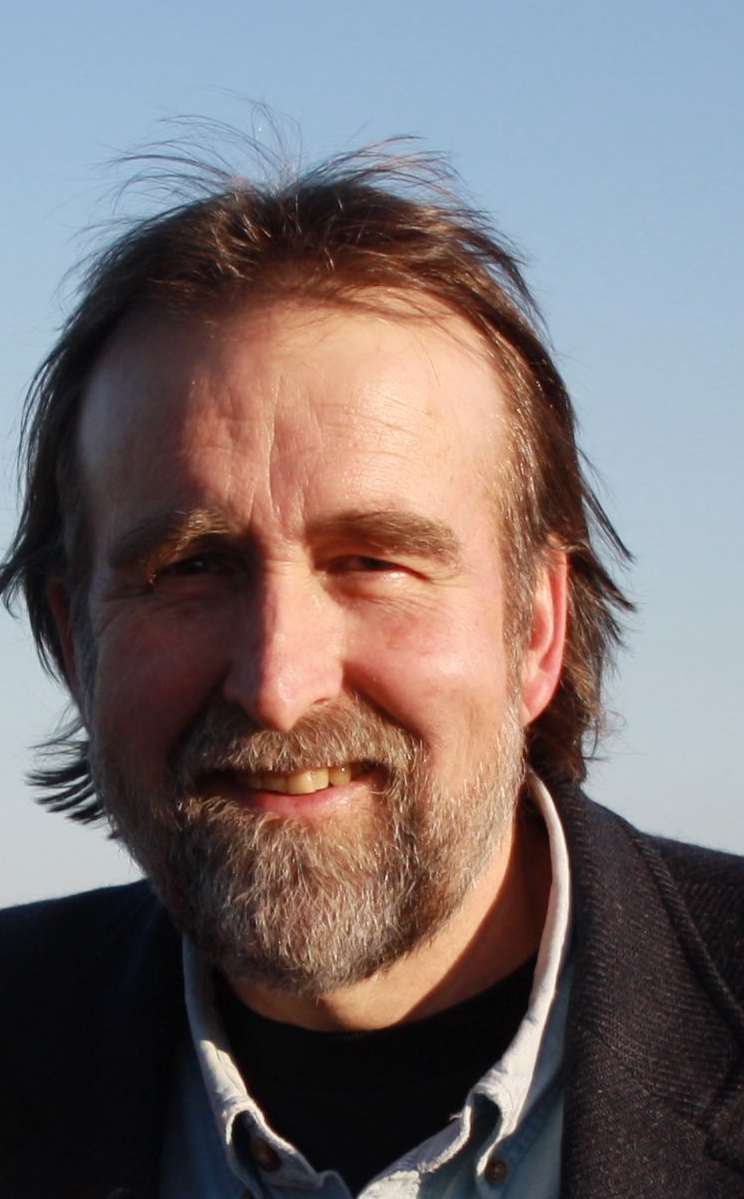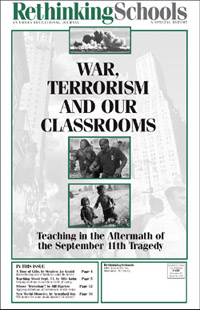by Bill Bigelow
 All of us who are old enough remember where we were on Sept. 11, 2001. I was in my office at home in Portland, Ore., upstairs, working on Rethinking Globalization. The contractor who was rebuilding our porch burst into the house and yelled for me to come downstairs and turn on the TV.
All of us who are old enough remember where we were on Sept. 11, 2001. I was in my office at home in Portland, Ore., upstairs, working on Rethinking Globalization. The contractor who was rebuilding our porch burst into the house and yelled for me to come downstairs and turn on the TV.
The next year, I was back in the classroom at Portland’s Franklin High School. The first anniversary of the 9/11 attacks fell on a Wednesday—a school day. I’d been out of the classroom for two years, working for Rethinking Schools. Returning to teaching at a time of “reform” made me feel uneasy—in my absence, the bell schedule had changed dramatically and a new “mentorship” period had been added, but without a clear vision of its purpose. Several days of school-wide “community building” activities had highlighted divisions among the staff and seemed to leave students confused. Trying to figure out how to commemorate the anniversary of the attacks at this disorienting start to the school year—and it was only my third day with students—made everything that much more unsettling.
My classroom efforts that day were weak. I still have my lesson plans. I asked students to write on the question:
“What have you learned as a result of the events of Sept. 11, or how has it changed you?”
I remember the discussion being shaky, at best—students seemed either puzzled by or uninterested in the Howard Zinn quote I distributed, one we had published in Rethinking Schools’ special “War, Terrorism, and Our Classrooms” issue the year before. It concludes:
“The future is an infinite succession of presents, and to live now as we think human beings should live, in defiance of all that is bad around us, is itself a marvelous victory.”
I love this hopeful quote, with its rich sense of “history” as something in-process, something that we can shape—and its implicit renunciation of both terrorism and war. But students seemed guarded—and who could blame them for not wanting to open up on this third day of class with a new teacher, a strange schedule, and mostly unfamiliar classmates?
Ten years after
I share my own awkward 9/11 anniversary experience as a way of saying: It’s not easy to figure out how to acknowledge such painful and momentous events, and anniversaries always come in the context of everything else going on—and this year, for students here in Portland, one new development is dramatically larger class sizes.
I’m not in the classroom everyday any longer, so won’t be with students for the 10th anniversary of the 9/11 attacks. Of course, a high school sophomore would have been about five years old when planes flew into the World Trade Center and Pentagon; so this is history more than personal memory for most of our students. But if I were in the classroom this year, I might approach the day in some of the following ways:
First, of course, I might not do anything. Looking back to that first anniversary, Sept. 11, 2002, I probably should have simply told students that our entire class was dedicated to attempting explanations for the world’s conflict and that the best way to commemorate the events of September 11 was to understand the world well enough so that we might help prevent these kinds of horrors in the future. It’s almost impossible for a one-day commemorative lesson to go much beyond surface knowledge.
☮
That said, as this anniversary comes at the very beginning of the school year, it might be worth finding a way to “feed two birds with one hand”—to explore the meaning of 9/11 as we build classroom community. One thought would be to have a “mixer activity” in which students meet one another and encounter their thoughts on a number of quotes and concepts. This kind of activity is a variation of the “tea party” that we’ve featured in Rethinking Schools articles (e.g., “Unsung Heroes” and teaching about the U.S. War with Mexico).
☮
Too often, at the opening of the year, teachers create getting-to-know-you activities that are disconnected from the curriculum. But the best community building occurs within the curriculum, not outside it. For example, students could be given a list of quotes that directly and indirectly address 9/11 themes. One of these might be Mahatma Gandhi’s famous observation that “An eye for an eye makes the whole world blind.” Or a 2005 quote from Pres. George W. Bush, defending the U.S. wars in Afghanistan and Iraq: “Our troops know that they’re fighting in Iraq, Afghanistan, and elsewhere to protect their fellow Americans from a savage enemy.”
In a “mix and mingle” format, students could be asked to “Find someone who strongly agrees with one of these quotes. Who is the person? What is the quote? Why does this person agree?” or “Find someone who has a personal story that connects with one of these quotes. Who is the person? What is the quote? What is this person’s story that connects with the quote?” The class session then would be built around substantial quotes as well as students’ lives and students’ responses to these quotes. Thus, students would pause to consider the meaning of September 11 as they learn more about their classmates.
☮
I’ve been following conversations about the new memorial to Dr. Martin Luther King, Jr. in Washington, D.C. An excellent conversation between Amy Goodman, Juan Gonzalez, Jesse Jackson, and Vincent Harding aired on Democracy Now!, this last August 26th. It made me wonder how Dr. King might have urged us to respond to the events of Sept. 11.
Another “feed two birds with one hand lesson” might be to describe to students the events of Sept. 11, 2001, and then to provide students an excerpt of Dr. King’s important April 4, 1967, speech, in which he denounces the U.S. war in Vietnam, and the “giant triplets of racism, militarism, and materialism…” Ask students to read this excerpt from Dr. King’s speech and to discuss what steps Dr. King would have urged following the 9/11 attacks, had he been alive.
☮
 It’s worth returning to the editorial that we wrote almost ten years ago in “War, Terrorism, and Our Classrooms,” which identifies and explicates some “core principles” to guide our curriculum. Educators need to: nurture student empathy; be multicultural and anti-racist; ask the deep “Why?” questions; enlist students in questioning the language and symbols that help frame how we understand global events; and honor dissent and those who challenge power and privilege as they work for justice. It’s a helpful editorial, and it’s worth considering how these principles could shape lessons on Sept. 11 and beyond.
It’s worth returning to the editorial that we wrote almost ten years ago in “War, Terrorism, and Our Classrooms,” which identifies and explicates some “core principles” to guide our curriculum. Educators need to: nurture student empathy; be multicultural and anti-racist; ask the deep “Why?” questions; enlist students in questioning the language and symbols that help frame how we understand global events; and honor dissent and those who challenge power and privilege as they work for justice. It’s a helpful editorial, and it’s worth considering how these principles could shape lessons on Sept. 11 and beyond.
The Rethinking Schools Winter 2001-02 issue, “War, Terrorism, and Our Classrooms” is 10 years old, but there are lots of articles in here that could be used with students, and/or form the basis of lessons.
- Linda Christensen’s “Poetry in a Time of Crisis,” is as timely as when it was written, and includes the stunning poem by the Palestinian/African American poet Suheir Hammad, “First Writing Since”
- My article, “Whose ‘Terrorism’?” asks students to define “terrorism” and then to apply those definitions to the behavior of governments—including their own—and corporations. The lesson undermines the notion that only “they” are terrorists and that “we” are always the good guys.
☮
And speaking of terrorists, the first European to consciously introduce terrorism into our own hemisphere was Christopher Columbus. In the spring of 1494, according to the Spanish priest Bartolomé de las Casas, Columbus ordered one of his officers on the island of Hispaniola, Alonso de Hojeda, to “lead a squadron by land to the fort of Santo Tomas and spread terror among the Indians in order to show them how strong and powerful the Christians were.” [See the Rethinking Schools book Rethinking Columbus for more details.] Those teachers beginning U.S. history classes with what gets called “The Age of Exploration,” might begin with the “Whose Terrorism?” activity and then ask students to apply their definitions to Christopher Columbus and other “explorers.”
* * *
Wouldn’t it be wonderful if ten years from now our students could think back and remember, “That’s when I began to ask questions. That’s when I began to think critically. That’s when I began to wonder why we have wars. That’s when I began to see myself as someone who wants to change the world.”
